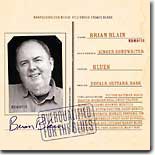 Originally from Quebec and based in Toronto since 1990, Brian Blain
has been performing his unique brand of Canadian country blues for
almost 40 years. He has played all kinds of music but has returned to
where he started, the folk blues that he learnt from a mail-order
instructional record. Additionally, this stalwart music-man has held any
music industry job that comes to mind.
Originally from Quebec and based in Toronto since 1990, Brian Blain
has been performing his unique brand of Canadian country blues for
almost 40 years. He has played all kinds of music but has returned to
where he started, the folk blues that he learnt from a mail-order
instructional record. Additionally, this stalwart music-man has held any
music industry job that comes to mind.
“I write about what I know”, says Brian explaining why his songs on
Overqualified For The Blues (NorthernBlues) all tell stories. Since
Blain’s singing style isn’t heavy or forceful, his relaxed vocals almost
sound as if he is in conversation with the listener. "Saab Story" has a
jazzy big band sound thanks to Jim Galloway’s unleashed sax. From this
initial song, Blain’s witty lyrics immediately emerge. "Blues Is
Hurting" reflects a sad but accurate state of the blues. Hearing about
clubs closing down, CD sales bottoming out, and being paid in beer is
disheartening. However, the bright sides are Blain proclaiming he won’t
get discouraged and Michael Jerome Browne performing harp. With fiddle
and mandolin, he gives "No More Meetings" a rootsy feel. Though it
describes what goes on in the urban jungle of corporate Canada, the song
has a rural vibe. Anyone who is vacationing or has retired from an
office job/committee will love the song.
Blain sings in French on "Enfant Choisi (Chosen Child)." Although a full
band performs the song, it – like "Buddhist Blain" – remains mellow.
More Francais can be found on "The Big Fire" – quite simply a touching
and beautiful composition – where Marc Roy’s mandolin puts your mind at
ease. Blain may be from the hills of Quebec, but the sounds of North
Mississippi hills transpire on Terrace Inn. "Hi-Tech Blues" features
Michael Fonfara’s joyous piano and depicts the most common type of blues
experienced in the 21st century. Blain can really relate since he spends
plenty of time working with and fixing computers. Ironically the song
appeared on his first CD, and as Brian says, “I had to upgrade this
song.”
"Sailing" sounds influenced by the oldest Delta blues and showcases
Blain’s 1963 Epiphone guitar. Sadly, the song reflects on those who die
too young and fast from disease. "One More Weasel" describes what
happens all too often at CD release parties, and displays Blain’s bass
guitar skills.
This folky disc features many Canadian blues celebrities, and is hard to
categorize. NorthernBlues president Fred Litwin classifies Blain “in a
category all his own.” Essentially, it is an acoustic CD, so there are
no wailing solos from the instruments. Instead, the focus is entirely on
the songs. The unique CD may only appeal to a limited audience. You will
enjoy it if you are into any form of roots music. Based on the
consistent strength of these original songs, Blain will surely be
considered in the same guitar playing and songwriting classes as Rick
Fines and Michael Jerome Brown.
--- Tim Holek
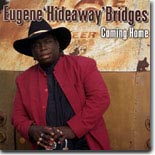 Eugene ‘Hideaway’ Bridges was born in 1963, and is the son of
blues guitarist ‘Hideaway Slim.’ At the tender age of five, young
‘Hideaway’ was performing with his father around Louisiana. Though he
has spent plenty of time in Texas, Eugene is literally a nomadic
musician. His home is wherever his next performance takes him. Annually
this includes his native America, Europe, and Australia. In September
2004, he recorded his fourth CD, Coming Home (Armadillo Records),
near Austin, Texas. Don’t expect his musical style to be isolated to the
Lone Star State. Do expect to fall in love at first listen. Bridges
wrote all 12 songs and performs guitar and vocals. He is joined by nine
guests, including a full horn section, and famed Texas guitarist Rocky
Athas, who grew up playing gigs with childhood pal Stevie Ray Vaughan
and received his own fame as lead guitarist for the legendary Black Oak
Arkansas.
Eugene ‘Hideaway’ Bridges was born in 1963, and is the son of
blues guitarist ‘Hideaway Slim.’ At the tender age of five, young
‘Hideaway’ was performing with his father around Louisiana. Though he
has spent plenty of time in Texas, Eugene is literally a nomadic
musician. His home is wherever his next performance takes him. Annually
this includes his native America, Europe, and Australia. In September
2004, he recorded his fourth CD, Coming Home (Armadillo Records),
near Austin, Texas. Don’t expect his musical style to be isolated to the
Lone Star State. Do expect to fall in love at first listen. Bridges
wrote all 12 songs and performs guitar and vocals. He is joined by nine
guests, including a full horn section, and famed Texas guitarist Rocky
Athas, who grew up playing gigs with childhood pal Stevie Ray Vaughan
and received his own fame as lead guitarist for the legendary Black Oak
Arkansas.
Triumphant horns and thundering percussion push the danceable "Giving Up
On Love" to the upper limit. The supremely smooth vocals make this
fascinating song worthy of being in the soul music history books. This
tune features a repetitive rhythm that gets perpetually stuck in your
head. The title track, with its early rock ‘n’ roll influence, also
features a rhythm that your body won’t sit still to.
The aching beat and acoustic guitar gives "In Your Arms Tonight" a pop
feel and flavor. "I Need You" has a similar taste. If you remember Bruce
Hornsby or Richard Marx, you get the picture. "I Wish Someone Would Have
Told Me" exhibits 12-bar blues and Bridges’ breathtaking vocals, which
become more and more incarnated. Ruf Ruffner’s uplifting organ supports
Eugene’s floating and soaring guitar notes.
Bobby Baranowski’s drums stomp during "Real Hero" and gallop on "Love Me
Right," while a three-person brass section adds the feel of a big band
orchestra. It’s time to party on "You’re The One," where Bridges
relieves Guthrie Kennard’s reverberating bass duties. Occasionally, as
on "I Woke Up This Morning" and "Love Me Right," Bridges’ guitar
playing, structure, and tone are too similar to B.B. King.
With his silky voice and equally smooth guitar, Eugene Bridges is living
out his dream by performing original music that makes you feel good. Had
he recorded this album a decade or two earlier, I’m convinced he would
have enjoyed commercial success. On Coming Home, Bridges
establishes himself as a credible songwriter, while Kevin Thorpe
discloses gifted production skills. On this elaborate CD; Eugene
‘Hideaway’ Bridges demonstrates he is capable of playing many styles of
music exceptionally well. It is one of those albums that you listen to
and ask yourself, “Why isn’t this guy a music superstar?” Traditionally,
blues musicians don’t fully mature until their senior years – Bridges is
the exception. This is one of my top ten selections for 2005.
--- Tim Holek
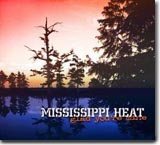 Mississippi Heat is a band that keeps sneaking back into my CD player
time after time. Their latest release on Crosscut Records, Glad Your
Mine, has been a constant reminder that this is indeed a band that
deserves more recognition. Glad Your Mine focuses on the vocal talents
of Inetta Visor and features inspired playing by her supporting cast:
Pierre Lacocque on harmonica; Steve Doyle and Chris Winters on guitar;
Chris “Hambone” Cameron on piano & B3; Spurling Banks on bass and Kenny
Smith on drums.
Mississippi Heat is a band that keeps sneaking back into my CD player
time after time. Their latest release on Crosscut Records, Glad Your
Mine, has been a constant reminder that this is indeed a band that
deserves more recognition. Glad Your Mine focuses on the vocal talents
of Inetta Visor and features inspired playing by her supporting cast:
Pierre Lacocque on harmonica; Steve Doyle and Chris Winters on guitar;
Chris “Hambone” Cameron on piano & B3; Spurling Banks on bass and Kenny
Smith on drums.
Inetta starts out man-bashing on “Dirty Deal,” a song in which her
current man is just not treating her right. Being blind in love, Inetta’s not aware of the fact that her man is just not treating her
right; he in fact is giving her “a dirty deal.” “Heartless Fool”
continues the theme with the thought that with all of the advances we
have in society, man is still basically selfish. A hungry child plays in
the street and the man drives by in his brand new Cadillac….who will
feed the child? Life is indeed too short and compassion for humanity is
more important than the glow of a temporary possession.
Things slow down a little bit with “She Ain’t Your Toy,” in which a male
friend is reaching out to Inetta for advice in his relationship. Her
advice is short and sweet…listen to what the woman says and appreciate her
mind. If you do that….”she’ll treat you sweet and kind!” “Glad Your
Mine” lets the world know that Inetta indeed has a good man, throughout
the years he’s been true, faithful and his love is strong. This good
woman obviously has found a good man!
Tolerance grows thin on “Give Me Yo’ Most Strongest Whiskey,” as Inetta’s man is screwing up. “When we should be makin love…that man want
to fuss & fight.” He’s implying that Inetta is cheating on him when in
fact he’s that one who’s out all night. Pierre gives us a particularly
inspired solo on this song and contrasts beautifully with the guitar
solo by Chris Winter. “Cool Twist” encourages everyone to get up and
dance. Pierre starts off the song with wonderful harp accents and Inetta
encourages everyone to dance…”take your time….there’s no need for
speed….it’s a cool, cool twist….oh what a treat!”
Inetta follows “Cool Twist” with the female national anthem, “I’m a
Woman!” Her rendition leaves no doubt that women are the superior sex
with their ability to do it all…..”when it comes to a bit of
loving….I’ll give you shivering fits!” Hear what she says…..Inetta is
definitely a woman!
Pierre Lacocque’s songwriting shines throughout Glad Your Mine. “Take My
Hand” is a song of celebration about good love….”Take my hand…let’s take
a stroll darling…wish this day would never end!” Great song about two
people in love who continue to share their hearts and lives. “Love Will
Play Tricks” finds Inetta suffering from a broken heart. As much as she
loves her man, the truth is that he’s been unfaithful and if she doesn’t
pay attention to the signs….”Love Will Play Tricks” on her mind. Hurt
but definitely wiser….the next man won’t fool Inetta with his game,
he’ll have to be a man of substance.
“Where Were You (Ode to Magic Sam)” is another brilliantly written song
by Pierre and features one of the best lyrics on the album…”I asked my
doctor what I should do.....he told me to stop messing with you!” The
object of Inetta’s affection is definitely causing her more trouble than
he’s worth. “Jamaican Night” is an instrumental featuring Pierre’s harp
as the lead instrument. Upbeat and breezy….”Jamaican Night” also
features Chris Winters and Chris Cameron on guitar and B3, respectively.
Glad Your Mine closes with the Denise LaSalle song “Real Sad Story,”
and Inetta gives us a powerful rendition of Denise’s song about married
men and the lines they use to attract a little spice in their life from
outside the house.
Mississippi Heat is a band that continues to impress. Founded by Pierre
in 1992, it’s a band that throughout all of its configurations remains
true to his vision and passion for great blues. Glad Your Mine will
remind of you that every time you put it into your CD player.
--- Kyle Deibler
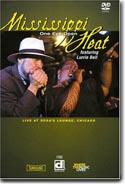 In the December edition of Blues Bytes I had the pleasure of reviewing
Mississippi Heat’s One Eye Open live CD release on Delmark
Records and thoroughly enjoyed the disc. So it was with great
anticipation that I eagerly threw the DVD version into my player and
kicked back to enjoy the show. What I found in watching the DVD version
is a recording that capture’s the essence of a live Mississippi Heat
performance with a couple of twists thrown in for good measure.
In the December edition of Blues Bytes I had the pleasure of reviewing
Mississippi Heat’s One Eye Open live CD release on Delmark
Records and thoroughly enjoyed the disc. So it was with great
anticipation that I eagerly threw the DVD version into my player and
kicked back to enjoy the show. What I found in watching the DVD version
is a recording that capture’s the essence of a live Mississippi Heat
performance with a couple of twists thrown in for good measure.
Filmed at Rosa’s Lounge in Chicago, Delmark used the ambiance of this
wonderful old historic blues club to showcase the performance of Pierre
Lacocque, Inetta Visor and the rest of Mississippi Heat. Lurrie Bell
sitting in
was a definite treat and I personally enjoyed seeing Bob Koester of
Delmark in the audience watching the performance. Bob and Delmark deserve all of
the
appreciation we can give them for the work they’ve done in recording
Chicago blues legends and making a blues label work in what is a
very tempestuous market these days.
Delmark utilized a three camera shoot for the DVD and I found that the
focus
on the performers made the adventure worthwhile. Pierre’s blistering
harp on the opening song, “Rosa’s Strut,” Lurrie’s passion on “19 Years
Old,” and
Inetta’s wisdom on “She Ain’t Your Toy” all confirmed the intensity of
the live recording. The patrons of Rosa’s were definitely treated to a
wonderful night of Chicago blues when this recording was made. A bonus
track not found on the CD, “Moanin’ and Crying,” featured a passionate
vocal by Inetta as well.
I appreciated the fact that Delmark included three sound options for
listening to the DVD: stereo, Dolby surround sound and DTS surround.
Having so many options ensures that the viewer is able to get the best
sound possible out of his home equipment. And while I’m sure that
producing blues DVDs is a break-even proposition for a record label at
best, I for one am glad that Delmark gave us the opportunity to view
Mississippi Heat in their element. We all can’t travel to Chicago every
time we’d like to, but One Eye Open at least reminds us why we should go
every now and then.
--- Kyle Deibler
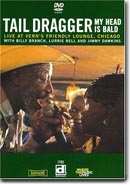 Delmark has long been the champion of Chicago blues and I find it
interesting that they took the time to put together a dual CD/DVD
release by Tail Dragger, an old school Chicago legend. Filmed in a
five
camera shoot at Vern’s Friendly Lounge in Chicago, Tail Dragger is
accompanied by a virtual who’s who of Chicago players in putting
together this live recording, My Head is Bald. With Lurrie Bell, Kevin
Shanahan and Jimmy Dawkins on guitar, Bob Stroger on bass, Willie Young
on saxophone, Kenny Smith on drums and Billy Branch playing harmonica,
Tail Dragger has all the firepower he needs to put on a wonderful show.
Delmark has long been the champion of Chicago blues and I find it
interesting that they took the time to put together a dual CD/DVD
release by Tail Dragger, an old school Chicago legend. Filmed in a
five
camera shoot at Vern’s Friendly Lounge in Chicago, Tail Dragger is
accompanied by a virtual who’s who of Chicago players in putting
together this live recording, My Head is Bald. With Lurrie Bell, Kevin
Shanahan and Jimmy Dawkins on guitar, Bob Stroger on bass, Willie Young
on saxophone, Kenny Smith on drums and Billy Branch playing harmonica,
Tail Dragger has all the firepower he needs to put on a wonderful show.
Opening with “Sitting Here Singing My Blues,” Tail Dragger takes the
opportunity to tell you about the four wives he’s had and that fact that
his current wife has told him that she’s leaving and not coming back.
Rather than sit and feel sorry for himself, he opens himself up to the
fact that everyone in the neighborhood is into his business and they
would be better off paying attention to their own household in the song “Tend to Your Own Business.” Tail Dragger’s opinion is that it doesn’t
make any sense to hide his problems so he just sits back, opens up the
doors and windows, and let’s everyone know what’s going on.
Moving on to “Prison Blues,” Tail Dragger laments the fact that his
woman did not stand by him when he got into trouble and had to do some
time. But he’s out now, back and better than ever…looking to make amends
for all he’s done wrong. “So Ezee” continues the tale with the opinion
that it’s way too easy for people to mess with your head. If you would
just stand up, pay attention and use some common sense…you’d be better
off.
“My Woman is Gone” continues a common theme in Tail Dragger’s life. He’s
loved, lost, loved again, lost again and still continues to be in the
game. But in this case his woman is indeed gone and she’s not coming
home. The next song finds Jimmy Dawkins picking up Kevin Shanahan’s
Gibson and alternating solos with Lurrie Bell on “My Head is Bald.”
Women have not held it against Tail Dragger that he doesn’t have a head
of hair. They love him for him money and his loving….not the hair on his
head. Got to love a man who makes the most of his assets!
“You Gotta Go” is short and sweet. I’ve had enough of you…I’m packing my
bags and leaving….”you gotta go!” This relationship has definitely ended
and Tail Dragger moves on in the song, “Cold Out Doors.” A bonus song
not found on the CD release, “Cold Out Doors,” finds Tail Dragger
thankful that his woman has a warm house, and even more importantly, a
warm bed! “Jump For Joy” closes out this live recording and features
Willie Young on an extended saxophone solo.”
My Head is Bald is an adventuresome project for Delmark. Tail Dragger’s
importance to Chicago’s blues history is evident in the regard he’s held
in by the players who surround him on this project. Old school blues
like this will probably not appeal to everyone, but for those who take
the time to enjoy the afternoon at Vern’s Friendly Lounge, it’s a
performance worth noting.
--- Kyle Deibler
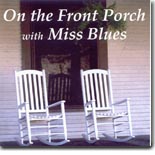 On The Front Porch With Miss Blues is a superb new album from Oklahoma based
Dorothy Ellis, better known (and deservedly so) as “Miss Blues.”
She’s ably backed by Jason Coombs on guitar, Mike Olson (bass), and
Jason Downing with some very effective harmonica.
On The Front Porch With Miss Blues is a superb new album from Oklahoma based
Dorothy Ellis, better known (and deservedly so) as “Miss Blues.”
She’s ably backed by Jason Coombs on guitar, Mike Olson (bass), and
Jason Downing with some very effective harmonica.
The CD opens with “This Little Light Of Mine,” an old traditional blues
that Son House made such a good job of some years ago.
This is a nice foot-tapping opening to the album, with the vocals and
the band melding together perfectly.
For me, the highlight of the whole CD has to be track two, “Good Morning
Blues,” and Miss Blues serves up a version that Leadbelly himself would
have been proud of.
The backing is impeccable, with haunting harmonica and beautiful guitar
work, but the vocals make the hairs on the back of your neck stand up –
WOW!!
Joe Primrose’s “St.James Infirmary” follows, and it’s another excellent
version, full of despair and atmosphere, and if you’ve never heard a
blues version of “Amazing Grace” that’s here, too!
There’s more old traditional blues covered here – “Bottle Up & Go,”
“John Henry,”
“When The Saints Go Marching In” and “Swing Low, Sweet Chariot.”
It’s almost impossible to pick a track here that’s better than the
others – they are all perfectly executed, both by Miss Blues and by the
musicians supporting her.
If you like traditional blues, well played, with lots of feeling and no
fancy effects, then get this CD and play it until it’s worn out.
--- Terry Clear
Reminiscence Of The Blues is another excellent issue from “Miss Blues,” hard on the heels of
On The
Front Porch, and equally as good. Dorothy Ellis’ belting vocals are used to superb effect here – witness
the first track on the album, Guitar Slim’s “The Things I Used To Do” –
excellent guitar work from Jason Coombs again.
This Album is made up with songs requested by Miss Blues’ fans, and they
obviously know their music, as there are some inspired choices here.
Miss Blues is backed, as usual by the band “Blind Dog Smokin” (always at
their absolute best when backing Dorothy), and they are joined by guest
musicians Englishman Aynsley Lister, and Hammond organ star Tommy
Carlyle,
Track two is an unusual combination of two Jimmy Reed songs. Entitled
“Tribute To Jimmy Reed,” this number takes “You Got Me Running” and
“Bright Lights, Big City” and rolls them into one memorable mixture of
pure Jimmy Reed.
A Dorothy Ellis arrangement of Lil Johnson’s “Don’t Let Your Left hand
Know What Your Right Hand Will Do” is next on the list – great vocals
again, and the band changing tempo up and down in the mid section of the
song – and then into “Sweet Home Chicago,” a good, rocking, up-tempo
version. One of those songs where your feet tap on their own.
The highlight of the CD is next up (as far as I’m concerned, anyway) –
Peter Clayton’s
“Hold That Train,” and it’s the best version I’ve heard, bar none!
The backing on this track is what makes this CD so special; Tommy
Carlyle’s Hammond organ holds the track together, with Carl Gustafson’s
harmonica weaving trails in and out of Jason Coombs’ guitar work. I
would listen to this track all day and all night long.
There’s an interesting version of Dorothy LaBostrie’s “Have My Husband,”
which was a hit for Irma Thomas. Miss Blues gives it a good up-tempo
beat and it rocks along over a great shuffle beat, with Carlyle’s
Hammond always in the background.
This is followed by the Dorothy Ellis arrangement of “Mama Says” – and
what an excellent track it is too. If I hadn’t already said that “Hold
That Train” was the highlight of the album for me, then this track would
have to have that honour.
Again, Tommy Carlyle does some very good work with his Hammond, in fact
he’s more to the fore in this track than any other.
The last track of the album is a wonderful version of “They Call It
Stormy Monday,” but it’s preceded by Miss Blues narrating a monologue
over some beautiful slide guitar work, which I’m guessing is provided by
Jason Coombs and Aynsley Lister together.
This monologue sends shivers down my spine – I can’t stop listening to
it.
This is the story of the roots of the blues and should be compulsory
listening for every
child of school age, lest we forget what went on with slavery, the KKK,
and other indignities.
“Stormy Monday” itself is right up there with the quality that you
expect from Miss Blues & Blind Dog Smokin’ – not much to add, except to
say it’s one of the best versions that I’ve heard in a long time – and
without being sexist in any way, it’s the best version I’ve ever heard
by a female vocalist.
--- Terry Clear
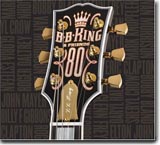 Well, what can you say about an 80-year-old man who can still belt out
the blues with the best of them – a man whose guitar playing is still as
good as it was 30 years ago? B.B King commands so much respect in his industry that the likes of Eric
Clapton, Van Morrison, Elton John, Gloria Estafan, Roger Daltrey, Mark
Knopfler, and others, still fall over themselves to work with him.
Well, what can you say about an 80-year-old man who can still belt out
the blues with the best of them – a man whose guitar playing is still as
good as it was 30 years ago? B.B King commands so much respect in his industry that the likes of Eric
Clapton, Van Morrison, Elton John, Gloria Estafan, Roger Daltrey, Mark
Knopfler, and others, still fall over themselves to work with him.
B.B. King & Friends - 80 (Geffen) celebrates B.B.King’s 80th birthday and was recorded (apart from
one track) in April 2005 in London, New York & Burbank, California.
The odd track out was recorded in February 2005 at Caesar’s Palace, Las
Vegas and features the bluesiest Elton John I’ve ever heard.
Elton sings and plays piano on the old Jimmy Rogers number “Rock This
House”, and the track closes a superb CD.
However, the album opens with a collaboration between B.B. and a man who
is rooted in the blues and regularly visits back there – Van Morrison.
Together they create one of the best versions of “Early In The Morning”
that I’ve heard in a long, long, time, maybe the best version I’ve ever
heard. Morrison’s gritty vocals and harmonica playing are perfectly
complimented by B.B.’s guitar work and vocals – the two of them
sound as though they were born to work with each other.
An unusual inclusion on the guest list is Billy Gibbons, of ZZ Top,
although, having said that, ZZ Top are a band with strong blues roots.
The duet between B.B. and Billy works very well on “Tired Of Your Jive,”
a track that B.B. first recorded back in 1967.
Eric Clapton pops up on “The Thrill Is Gone,” recorded in the Olympic
Studios in London, England – the guitar duets between B.B. and Clapton are memorable, but Clapton declines any vocal work – maybe the
superb version that B.B. made with Tracy Chapman for the CD Deuces
Wild influenced his decision?
The choice of tracks on this album is well made and a little adventurous
in places, but everything works well, and there really isn’t a weak spot
on the CD – even artists that are really connected with the blues (Daryl
Hall, Sheryl Crow and Gloria Estefan) make a very valid contribution –
possibly they are blues lovers as well as being obvious B.B.King fans.
Crow joins B.B. for the Little Willie John track “Need Your Love
So Bad,” and their vocals dovetail together almost in a Ray
Charles/Betty Carter way. I’ll look at Sheryl Crow in a different light
after this, as I’ve never really been a fan.
Hall helps out on “Ain’t Nobody Home,” Estefan lends a hand
on “There Must Be A Better World Somewhere;” both tracks have a
nice quality to them.
John Mayer provides some guitar work and vocals on Leon Russel’s
“Hummingbird”, a track of which King has recorded about 10 versions.
If you ever had any doubts about the talent of Mark Knopfler, listen to
his guitar playing on “All Over Again” – you won’t have any doubts after
hearing this track!
Glen Frey puts in an appearance on a lovely version of Roosevelt Sykes’
creation “Driving Wheel,” complete with brass section backing.
Ex-Who vocalist Roger Daltrey makes a good job of providing vocals on
“Never Make Your Move Too Soon,” showing that he’s still got a handle on
the blues. King’s vocals open this track and then Daltrey comes in on the
second verse, and there’s a distinct similarity between the two!
I said earlier that there’s no weak spot on this CD, and I stand by
that.
However, there is a track that, to me, is not quite as good as the rest
– unfortunately, it’s a song that’s a big favourite of mine!! It’s
Willie Nelson’s “Funny How Time Slips Away,” with Bobby Bland providing
the vocals.
This certainly isn’t a bad track. It’s just that after hearing Al Green
and Lyle Lovett do it, I haven’t heard anything else that lives up to that
version.
This is a superb CD, as much for the material selected s for the array
of guest stars.
But more than that, for a man of 80 to still have such a powerful voice
and such control over his guitar playing is a testament to B.B.King’s enormous talent and charisma.
Buy this one and enjoy!!!
--- Terry Clear
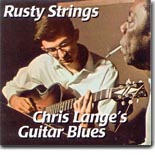 I guess that Switzerland isn’t exactly well known as a location for the
blues, but Rusty Strings is a CD from a man who turns that
presumption on it’s head. Chris Lange started playing blues
guitar in the 1950s in his Zurich home, and got a tremendous boost to
his enthusiasm when Champion Jack Dupree visited that city to play the
“Africana Club.” Chris, in time, became a regular guitarist with
Champion Jack, playing with him at the Africana Club and also on some of
his albums on the Folkways & Storyville labels between 1961 and 1965.
I guess that Switzerland isn’t exactly well known as a location for the
blues, but Rusty Strings is a CD from a man who turns that
presumption on it’s head. Chris Lange started playing blues
guitar in the 1950s in his Zurich home, and got a tremendous boost to
his enthusiasm when Champion Jack Dupree visited that city to play the
“Africana Club.” Chris, in time, became a regular guitarist with
Champion Jack, playing with him at the Africana Club and also on some of
his albums on the Folkways & Storyville labels between 1961 and 1965.
Rusty Strings is a CD compilation of tracks that Chris Lange
recorded in the 1960s, and consequently it has a nice 60s feel to it –
and some good blues too. Most of the tracks Chris Lange wrote himself,
but there are three covers of old blues numbers: one by Champion Jack
Dupree, “Woodchopper Blues,” a James Moore track, “Slidin’ In My Heart,”
and “Call On Me” by Deadric Malone, which was a hit for Bobby Bland.
The original Chris Lange tracks are a mixture of blues, R&B and '60s
instrumental rock, and they are all very good. Some are very traditional
type blues (“Elmore's Death,” “Christmas Blues,” “The Blues Way Down At
The Bottom” and others), some are R&B, such as “Rock n Rollin’ Rhythm &
Blues” and “It’s Boogie Time,” and some sound like the “Shadows” leaning
towards the blues.
From the originals, I tend to gravitate naturally more to the blues
tracks, and my absolute favourites here are a blues shuffle called
“Horseback,” which Chris recorded back in 1967, and “Muddy’s Thought,” a
lovely thoughtful, slow blues, full of atmosphere.
There are 21 tracks altogether, and not a bad one amongst them. The
highlight for most people will be track eight, “Woodchoppers Blues,” as
it was not only written by Champion Jack Dupree, but it features him on
vocals too! It’s classic Dupree from 1960/61, recorded at a house party
in Zurich as a demo for the Danish “Storyville” record company. Chris
Lange was 18 years old at the time!
This is a superb piece of blues history, and it’s available direct from
www.cdbaby.com.
--- Terry Clear
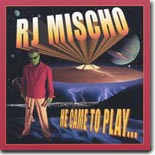 From the upper Midwest, harmonica player/vocalist/leader RJ Mischo’s
head was turned early on by Muddy Waters live. He later took cues from
Mississippi blues men and especially Percy Strother. He now lives in
SoCal after a stay in San Fran. This explains the evolution of his blues
style. THIS is what better-known blues bands enjoying success should
sound like. The cover graphics of He Came To Play (Crosscut
Records) are fun; Mischo is a green
Martian armed with shades and mic stand invading some unsuspecting earth
city from his flying saucer fashioned from a drum cymbal. It is the next
in a handful of CDs he has released on various labels.
From the upper Midwest, harmonica player/vocalist/leader RJ Mischo’s
head was turned early on by Muddy Waters live. He later took cues from
Mississippi blues men and especially Percy Strother. He now lives in
SoCal after a stay in San Fran. This explains the evolution of his blues
style. THIS is what better-known blues bands enjoying success should
sound like. The cover graphics of He Came To Play (Crosscut
Records) are fun; Mischo is a green
Martian armed with shades and mic stand invading some unsuspecting earth
city from his flying saucer fashioned from a drum cymbal. It is the next
in a handful of CDs he has released on various labels.
Leader RJ states in his liner notes: “This album was recorded live in
the studio, with all the musicians, amps and drums in one room gathered
around an upright piano. Vocals were live in the room thru a ’60s Sure
Vocal Master PA. Recording was analog on two-inch tape. You may notice
several pops and clicks on a few tracks, I was snapping my finger too
close to the mic.” Results are super. The sound is warm and inviting.
The only added elements are sound effects for set-up of certain tunes,
including one swear word.
Of the musicians, the bassist really drives this music, thumping like an
old stand-up. It’s listed as electric and that is hard to believe.
Tight, but a loose party. You may be in Texas or somewhere in SoCal.
Piano is tasty and seldom solos, a little busy in spots. After all we
don’t want shades of Herbie Hancock in this crowd, just Otis Spann.
Guitar solos are snappy and in excellent taste. The leader has a good
voice and his harp is rich and felicitous (RJ is sponsored by Hohner
harmonicas). The one horn player plays several, and the baritone sax is
so rich you hear a section. And I’m happy about the inclusion of drummer
June Core, a naturally gifted technician who was a spark plug during his
moment with Little Charlie and the Nightcats.
Flow is important and this album starts in perfect tempo. It begs
repeated playing. There are Little Walter, two-beat, and then surf
touches. Titles are a mixture of originals and covers, like “20%
Alcohol,” “Mojo Lounge,” “Hang Up And Drive,” and “Hippie’s Playground.”
From midpoint in the album the fare peters out a little, rhythms and
ideas repeat slightly, but they still stand strong individually. Then
the concluding couple tracks work well, a novelty capped by a strong,
then fading, instrumental. Blues grade of A-.
---Tom Coulson
Radio broadcaster/musician
comments to tcoulson@ktar.com
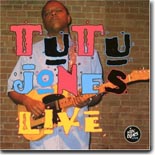 Tutu Jones is a young Dallas-based guitar slinger and leader whose
extensive music business background includes work with people like R.L.
Burnside and Z.Z. Hill. He has done studio recordings, but Live
(Doc Blues Records) is his
first live release. He fronts a four-piece group with customary rhythm
plus organist Ronnie Bramhall (of the Texas Bramhall Brothers blues
band, not the Texas father and son Doyle Bramhall and Doyle II). Tutu
sounds Buddy Guy-influenced as player and singer, tempered and mellowed
by Albert King tendencies and Freddie King tunes. Partway thru the CD he
also nods to B. B. King with a similar throaty vocal delivery. As a
guitarist his soloing is hot and very much indeed Texas. The crowd on
the disc eats it up.
Tutu Jones is a young Dallas-based guitar slinger and leader whose
extensive music business background includes work with people like R.L.
Burnside and Z.Z. Hill. He has done studio recordings, but Live
(Doc Blues Records) is his
first live release. He fronts a four-piece group with customary rhythm
plus organist Ronnie Bramhall (of the Texas Bramhall Brothers blues
band, not the Texas father and son Doyle Bramhall and Doyle II). Tutu
sounds Buddy Guy-influenced as player and singer, tempered and mellowed
by Albert King tendencies and Freddie King tunes. Partway thru the CD he
also nods to B. B. King with a similar throaty vocal delivery. As a
guitarist his soloing is hot and very much indeed Texas. The crowd on
the disc eats it up.
He announces each tune, as most audiences appreciate. But from the very
beginning: “We’d like to start it off slow before we get a little hot
y‘all...” not always a good idea. With some of the funky and soul-tinged
offerings elsewhere on the disc, it seems sequencing and buildup could
have been more constructive or creative. Selection variety is neither
beefy or thin, Thematically the words don’t go too deep, just regular
blues life stuff.
It’s an average live recording, the crudeness not a detraction. In fact
he gets extra credit for inclusion of what he calls “a vintage, lo-fi,
high impact bonus track,” an upbeat treatment of Elmore James’ “Sky Is
Crying.“ Yep, those surreptitious crowd recordings sometimes capture the
best feeling. Blues grade of C+.
---Tom Coulson
Radio broadcaster/musician
comments to tcoulson@ktar.com
What defines a performing artist’s success? It may be favorable reaction
from three groups: The public, critics and fellow musicians. In Susan Tedeschi’s case some of the public and a few critics haven’t taken to
her kindly since her debut some years ago as a blues guitarist/vocalist.
(I haven’t gotten any musicians opinions, and haven’t seen her live
yet). But another definition of success might be a number of major-label
album releases with sufficient sales. Maybe it’s her slightly grainy
voice or perhaps it’s the overnight success of her band’s first album,
Just Won't Burn (released from her hometown of Boston on Tone-Cool
Records in early 1998 that recently went gold) that gives an allusion of
too much too soon. Setting these distractions aside, let’s look at
Hope And Desire, Tedeschi's fourth album and her first for Verve Forecast,
all on its own.
This CD focuses on Tedeschi’s vocal style, with an emphasis on soul
music. Backing appears to be a core group of four or five, with guests,
and apparently not her current touring band. The first notes that
introduce track one are acoustic guitar. It’s mellow, and feels like
gospel with obligatory organ in short order. Drum sound is a standout.
The production is excellent, honors going to Joe Henry, the acclaimed
singer/songwriter who has also produced Solomon Burke, Aimee Mann, Jim
White and Bettye Lavette. The flow is well placed, with the album making
a definite statement. Normally known for her own hot guitar playing,
here it is almost non-existent, allowing the short solos to guests Doyle
Bramhall II (son of Texas singer/drummer Doyle Bramhall, not of the
Texas Bramhall Brothers) and her husband, Derek Trucks, currently with
the Allman Brothers Band, as guest on a couple tracks .
Among Susan Tedeschi’s talents is songwriting, but this CD includes none
of her own works. Instead, she interprets either well-known writers or
songs associated with famous performers: Ray Charles ("Tired of My
Tears"), the Rolling Stones ("You Got the Silver"), Bob Dylan ("Lord
Protect My Child"), Aretha Franklin ("Share Your Love with Me"), and Fontella Bass ("Soul of A Man").
My favorite track is “Share Your Love With Me,” which has a great hook
within the ultra slow tempo. Iris DeMint’s “Sweet Forgiveness” and Jerry
Merrick’s “Follow” are pretty, engaging ballads. Otis Redding’s
“Security” was once also done by Etta James, and these giants are
impossible to top. "Magnificent Sanctuary Band" (originally performed by
Donny Hathaway) features guests Blind Boys Of Alabama, but there are a
couple noticeable clunker vocal notes from the leader, the inclusion of
which is surprising considering the production work overall. The disc is
redeemed though with the closing track, just a distorted, loose guitar
and perhaps percussion accompanying Ms. Tedeschi‘s voice, on what sounds
like “Please Send Me Someone To Love” with different words. No wonder.
It’s Percy Mayfield’s “Danger Zone.” This alone is worth the price of
the disc.
Blues grade of B.
---Tom Coulson
Radio broadcaster/musician
comments to tcoulson@ktar.com
Meet Jackie Greene, 24, a Sacramento-based artist with three released
albums already to his credit plus a DVD. On Sweet Somewhere Bound, he
plays most of the instruments, the most obvious being strings, keys and
percussion. The disc is harmonica-heavy, as is the fashion lately, and
this is not a blues album. It’s on the Verve/Forecast label which seems
to allow wide-open themes that flow, creating a definite direction and
overall statement. The back cover suggests filing it under “pop vocals.”
The all-original album starts out hinting at country, maybe bluegrass,
with acoustic guitar, on “About Cell Block # 9.” Then it feels like
gospel due to an organ, going on to more like album rock with effective
electric guitar soloing. Greene’s singing is decent, his musicianship up
there and his songwriting quite good on all selections. There’s energy,
then a third of the way thru the album takes a sharp turn as the harp
goes un-amplified on several tracks in the rack-mounted Dylan or Neil
Young style. This gets old really fast unless you prefer a heavy dose of
singer/songwriter stuff. Then back to album rock. Disturbingly appealing
is “Miss Madeline” about strong feelings for a street person. “I Don’t
Care About My Baby” roughens his vocal some with good acoustic slide
guitar. The remainder is limpid and downtrodden, profound enough to
leave an impact.
Greene is currently in the studio with producer Steve Berlin (Los
Lobos), recording a CD of all new material for Verve Forecast, which is
slated for release in early 2006. Blues grade for Sweet Somewhere
Bound is non-applicable, but a musical grade of B-.
---Tom Coulson
Radio broadcaster/musician
comments to tcoulson@ktar.com
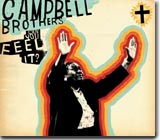 Though Sacred Steel Guitar’s young gun Robert Randolph has gotten a lot
of attention from the music industry in recent years, The Campbell
Brothers have been a major factor on the Sacred Steel scene for a long
time. In fact, the brothers were a huge influence on most of the
youngsters playing steel guitars out there in various House of God
churches today (Chuck Campbell reportedly got Randolph his first
guitar).
Though Sacred Steel Guitar’s young gun Robert Randolph has gotten a lot
of attention from the music industry in recent years, The Campbell
Brothers have been a major factor on the Sacred Steel scene for a long
time. In fact, the brothers were a huge influence on most of the
youngsters playing steel guitars out there in various House of God
churches today (Chuck Campbell reportedly got Randolph his first
guitar).
Though a lot of their work has appeared on Arhoolie, either on
Sacred Steel compilations or their three albums for the label, their new
release, Can You Feel It? (Ropeadope Records), may be their best work
yet. The CD’s 11 tracks consist of songs that the band has been
playing in church for the past three years. The Campbells feature two
steel guitarists, brothers Chuck (pedal steel) and Darick (lap steel),
and they are out front and center for this release, which is where they
should be, laying down some fantastic sounds. Their brother Phil plays
rhythm and MIDI guitar and also contributes some great licks in support
of his brothers, especially on the jazzy closing track, “No Mo’ One Mo’”
(don’t miss the swinging bonus cut that is at the tail end of this
track).
The instrumental tracks are stunning, ranging from the funky
opener, “Frammin’” to the smooth “Good All The Time,” to a cover of “A
Change Is Gonna Come” that literally screams passion. Additional
highlights include a pop-ish instrumental of “Amazing Grace” and a
bluesy take on “Don’t Let The Devil Ride,” with sizzling vocals from
Denise Brown, who also lends first-rate vocals to several of the other
tracks, including “The Judgement,” “Power Lord,” and “Rally Time.” The
rhythm section of Carlton Campbell (drums) and Malcolm Kirby (bass)
provide stellar backing, and organist John Medeski, founder of the
Sacred Steel super group, The Word, produced the disc and plays organ on
selected tracks.
In the Bible, the Psalmist said, “Make a joyful noise
to the Lord…” and the Campbell Brothers are definitely doing that with
this excellent release that, hopefully, will show those unfamiliar with
their music what all the fuss is about.
--- Graham Clarke
Pennsylvania resident Ernie Hawkins is a master guitarist, specializing
in Pre-War East Coast Piedmont and Texas steel-string fingerpicking
styles. He learned his craft from such masters as Reverend Gary Davis,
Mance Lipscomb, Son House, and Mississippi Fred McDowell. In addition,
Hawkins has given guitar workshops all over the world and produced
instructional videos featuring the music of Davis, Lipscomb, Lightnin’
Hopkins, and Blind Willie McTell. He’s also recorded several discs of
excellent acoustic music, the latest being Rags & Bones, which is a
finely crafted collection of tunes composed by others many years ago,
but given new life by Hawkins’ exquisite fret work.
While some
guitarists’ interpretations of their heroes’ compositions come off as
rather lifeless in comparison with the originals, this is not the case
with Hawkins’ approach. His interpretations are faithful to the
originals, but the fire and passion Hawkins brings to each song gives
them a renewed freshness. Of the 14, four are compositions
by Reverend Davis (if you’ve never heard the good Reverend and enjoy
acoustic guitar, you owe it to yourself to track down some of his work),
and are masterfully done by Hawkins (“Make Believe Stunt,” “The Boy Was
Kissing The Girl,” “I Can’t Be Satisfied,” and “I Am The Light Of This
World,” which features a stirring vocal from guest Maria Muldaur).
There
are also a couple of fun covers of Louis Armstrong classics (including
“Potato Head Blues”), an affectionate take on Mississippi John Hurt’s
“Avalon Blues,’ and a great version of McTell’s “Statesboro Blues.”
Hawkins only sings occasionally, but he has a pleasant voice that lends
itself well to the songs. In addition to Muldaur, Marc Reisman
contributes harmonica to a couple of tracks, George Heid adds percussion
to a couple of tracks and Guy Gillette plays bones on “The Boy Was
Kissing The Girl,” but the real star of the disc is Hawkins’ 6-string
and 12-string resonator guitars.
Rags & Bones is partially supported by
a grant from the Pennsylvania Performing Arts on Tour program, and is
definitely worth a listen if you’re a fan of acoustic guitar. For more
information on Ernie Hawkins and his workshops and videos, visit
www.erniehawkins.com.
--- Graham Clarke
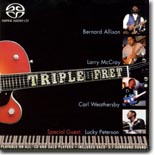 Seeking to recapture some of the magic of one of the finest blues
releases of the past twenty years (1985’s guitar summit, Showdown!,
which featured Albert Collins, Johnny Copeland, and Robert Cray), JSP
Records has teamed up three of the blues scene’s “Young Lions,” Bernard
Allison, Larry McCray, and Carl Weathersby.
Seeking to recapture some of the magic of one of the finest blues
releases of the past twenty years (1985’s guitar summit, Showdown!,
which featured Albert Collins, Johnny Copeland, and Robert Cray), JSP
Records has teamed up three of the blues scene’s “Young Lions,” Bernard
Allison, Larry McCray, and Carl Weathersby.
The result of the modern-day
summit, which also features Lucky Peterson playing keyboards and
Showdown! alumnus Johnny B. Gayden on bass, became Triple Fret, and
while it’s not the colossal set its predecessor was, it’s still a pretty
strong disc. The three guitarists are in peak form, both vocally and on
their instrument of choice.
The focus is on ensemble playing, as each
guitarist takes a vocal and then a solo, but each gets their own solo
track as well. While Allison has recorded frequently in the past few
years, it’s been awhile since we’ve heard much from Weathersby or McCray
(though thankfully both did release albums this past year after
significant absences), so it’s really good to hear them. Peterson lends
rock-solid support on keys throughout (even stepping out front for the
funky instrumental, “Where’s Lucky”) and Gayden and drummer Steve McCray
keep things deep in the pocket, with strong support from the Nutmeg
Horns.
The weak point of the disc is probably the songs, which are all
original compositions dealing with familiar blues themes, maybe a little
too familiar in some cases for some fans. However, when you pick up a
disc like this, the songs are probably not the main thing you’re looking
for. What Triple Fret does deliver on is what most blues fans are
looking for, some awesome blues guitar by three of the prominent
torch-bearers on the current scene. That alone makes it worth a
recommendation.
--- Graham Clarke
The Johnny Hawthorn Band features a potent mix of rock and blues in
their self-titled release on the Abe’s Records label. Hawthorn is a
fantastic guitarist in the Clapton/Hendrix vein who has previously
toured with Toad the Wet Sprocket, and also has a great way with a
lyric, composing nine of the 11 tracks. The original songs will
remind you of Tom Petty with their classic rock sound, but there are
also occasional echoes of Stevie Ray Vaughan and the Allmans present as
well. “Walden’s Pond,” “Sorry,” “Still In Love,” and “Hey Baby” are
highlights.
Though not exclusively a blues band, they do pay a visit to
the genre with a take on Earl King’s “Come On” that would do Jimi
Hendrix proud, and an all lap steel version of “Crossroads” that will
definitely make you stand up and take notice. The band is a trio,
composed of Hawthorn on guitar, Steve Heidtman on bass, and Mike Sauer
on drums, with Frank Zappa alum Arthur Barrow contributing some Hammond
B3 on a couple of tracks. Toad the Wet Sprocket singer/guitarist Todd
Nichols produced the disc. Fans of blues or classic rock will find much
to enjoy on this disc. It’s available at
www.cdbaby.com. For more
information on the band, visit
www.johnnyhawthorn.com.
--- Graham Clarke
Austin, Texas guitarist Tracy Conover has played with Albert Collins,
Earl King, Double Trouble, and has made quite a name for herself on the
Texas music scene over the past decade and a half. Her 2004 CD, Live! At
the Cactus Moon (Guardian Wolf Music), is a thrilling blues/rock guitar
ride from start to finish. Conover is an expressive, confident singer,
but she’s an absolute monster on the Strat with her fiery lead work.
The
disc has eight original compositions and one cover, a roaring take on
Freddy King’s “Goin’ Down” (a highlight of the recent Ruf compilation,
Blues Guitar Women). The originals are also impressive, with the
highlights being the rocking opening cut, “Addiction,” “Calvin,” an
instrumental that really smokes, and the spellbinding instrumental,
“Rainforest.”
She really shows off her soulful vocal style on tracks
like “Rest My Wings,” and “Wanta Be An Angel.” The final cut on the disc
is a studio track, “Tell Me,” and is a more sedate affair, with the
focal point being Conover’s sultry vocal. Her backing band, Roger Tausz
on bass and Charlie Fountain on drums, provides excellent support.
You’ll certainly be hearing more from this lady in the future. She’s got
the goods and delivers, big time. You can find this great CD at
www.cdbaby.com. You can find out more about Tracy Conover at
www.tracyconover.com.
--- Graham Clarke
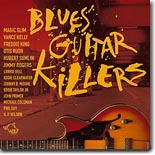 The
completists at Austria's Wolf Records have issued a strong Chicago
guitar compilation, Blues Guitar Killers, that doesn't blaze any
new trails but still presents 14 good samples of smokin' blues guitar.
The
completists at Austria's Wolf Records have issued a strong Chicago
guitar compilation, Blues Guitar Killers, that doesn't blaze any
new trails but still presents 14 good samples of smokin' blues guitar.
The name most prominent throughout the collection is that of the great
Chicago guitarist John Primer. He is the backing guitarist on my
favorite cut, an awesome slow blues, "Foot Loose & Fancy Free," from
vastly underrated Vance Kelly. There is one cut credited to Primer as
the bandleader, the great slow blues "Smile In Your Face," from 1987. In
addition, he is one of the Tear Drops behind Magic Slim on a 1991 Vienna
recording of "Spider In My Stew," backs up Lurrie Bell on "What Can A
Poor Man Do," Phil Guy on "What Have I Done" and Jimmy Rogers on
"Chicago Bound", and shares an acoustic duo rendition of "I've Been
Gone" with Hubert Sumlin.
Jimmy Rogers is one of the greatest bluesmen of all time, for my money,
and the aforementioned "Chicago Bound," from 1989 is a fine
representation of his sound from that era. The oldest and best-known
recording is Otis Rush's classic "I Can't Quit You Baby," from 1956,
with Al Duncan (drums), Willie Dixon (bass), Wayne Bennett (guitar), Red
Holloway (sax), Lafayette Leake (piano) and Big Walter Horton
(harmonica) providing accompaniment on what I believe to be the Cobra
Records original. Another classic is Eddie Clearwater's 1977 recording
of the Chuck Berry-sounding "2 x 9."
Other Chicago guitarists featured on Blues Guitar Killers include
Johnny B. Moore, Eddie Taylor Jr. and Michael Coleman, the latter
putting out nice fretwork on "Mustang Sally."
The two non-Chicagoans on this disc are Freddie King, who is represented
by an extended live version of "Stormy Monday Blues," recorded in France
in 1974, and fellow Texan U.P Wilson, who tears it up on a live 1994
version of "Crossroads."
I wouldn't call Blues Guitar Killers an essential part of your
blues library, but it's a nice collection to have around for those days
when you're hankering for some solid blues guitar.
--- Bill Mitchell